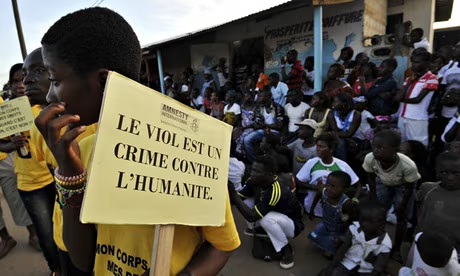49th Ordinary Session of the African Commission on Human and Peoples’ Rights, 28 April – 12 May 2011, Banjul, The Gambia
Statement by IHRDA and Cairo Institute for Human Rights Studies (CIHRS) on the Reservations made by Egypt to the African Charter on Human and Peoples’ Rights
The Institute for Human Rights and Development in Africa (IHRDA), in collaboration with the Cairo Institute for Human Rights (CIHRS) would like to applaud the people of Egypt for the inspirational steps they have taken towards a new era of democracy and justice. The courage and resolute adherence to the principles of justice and non-violence have inspired and continue to inspire the work towards respect for human rights in Africa.
The peaceful revolution and continuing changes in constitutional and statute law offer a new hope for the respect for human rights in Egypt. It is in this light that we recall that Egypt is one of only two states to have entered reservations on ratification of the African Charter on Human and Peoples’ Rights. The three reservations concern the guarantee of freedom of conscience, non-discrimination of women and children and the right to receive information.[1]
The reservation on Article 9(1) of the African Charter guaranteeing the right of every individual to receive information reads – “Egypt shall interpret this paragraph being applicable only to information, the obtaining of which is authorised by Egyptian laws and regulations”.
The African Commission has been resolute in rejecting the subjugation of continental human rights standards to restrictive national laws that nullify the human rights guaranteed. This is particularly critical in the context of the current transition in Egypt. It is important that the people access information on the decades of injustice and find the truth about corruption, torture, missing persons. For several years, thousands of Egyptians were subjected to blatant human rights violations by members of the security forces, particularly the much-feared State Security Apparatus, with no access to information on their cases until today. It is only fitting that an independent inquiry body be formed to grant these individuals their right to truth, along with granting them a long awaited justice. It is indeed with a frank disclosure that indispensable elements of transitional justice such as reparations and justice are achieved
During the old regime, infringements on the operations of newspapers and work of journalists, imprisonment of bloggers, attacks against protesters and abduction of activists all featured as part of actions against Egyptians’ right to freely receive information. These included the arrest and imprisonment for several years of bloggers such as Karim Amer, Moussad AbuFajr and Hany Nazeer. It is equally important to note that the arrest of these bloggers, and hundreds other citizens, were made possible under the emergency legislation – which continues until today in Egypt – along with several other repressive national laws that directly restrict human rights.
During the Revolution, the government of Egypt shut down all telephone and internet communications. The action not only violated article 9 (1) guarantees but also exacerbated the security and humanitarian situation as various cases of deaths and increase in crime were reported as a result of the lack of communication. There were, in addition, mass violations against journalists and persons seeking to communicate information about the Revolution.
The 2011 Egyptian Revolution, along with that of Tunisia, has been exceptional for the use of social media on the internet, allowing millions of Egyptians as well as the rest of the world to receive information on the Egyptians’ attempt to cross over to democracy and respect for human rights. It exemplifies the centrality of the right to receive information for the maintenance of respect for human rights and the African Charter itself.
Even after the Revolution, it is important to note that Egyptians have witnessed further infringements to the right to free expression and reception of information. The case of blogger Michael Sanad, acts as a vivid example of continuation of existence and application of repressive laws. Sanad was arrested on 28 March 2011 and sentenced on 10 April 2011 to three years’ imprisonment by a military court for expressing his views on the Supreme Council of the Armed Forces, currently ruling the country.
The African Commission has itself spoken resolutely on the right to receive information and against attacks on journalists and other human rights defenders for their expression of protected opinions[2], particularly under the guise of protecting national security[3]. Not only is this right expounded in its soft law[4], but has been further concretised in its caselaw in at least ten communications that found violation of the Article 9(1)[5].
We also express our concern for the reservations on Articles 8 and 18 (3). Respect for freedom of conscience (Article 8) is critical for the stability and sustenance of human rights in multicultural societies such as Egypt. Considering the sectarian tensions raised by this question, particularly as concerns constitutional review and the status of Article 2 of the Egyptian Constitution, we advice caution and call on all parties and stakeholders to desist for inflammatory sentiments and maintain the peace on the basis of equality and non-discrimination.
Further, Article 18 (3) of the African Charter offers the only direct reference to women and children in the African Charter[6]. In the spirit of commitment to the Revolution, Egypt should withdraw its current reservation on Article 18 (3).
Recommendations
Within this era of constitutional and political change, it is indeed crucial that the Egypt withdraws its reservations to the African Charter as a sign of commitment to the people’s will to live in an open and democratic society that respects their human rights.
We therefore urge Madame Special Rapporteur for Freedom of Expression and other relevant special mechanisms of the African Commission to engage the State of Egypt with a view to achieving a withdrawal of these reservations in a timely fashion, in accordance with the unambiguous demand of the millions across Egypt.
[1] Egypt has also made reservations on the African Charter on the Rights and Welfare of the Child. These are that Egypt: Does not consider itself bound by Article 21 (2) regarding child marriage and betrothal of girls and boys, Article 24 regarding adoption (although this is under review and a similar reservation to the CRC has already been removed); Article 30 (a-e) regarding the special treatment of children of imprisoned mothers; Article 44 which establishes that the Committee can receive Communications; and Article 45 (1) regarding the Committee conducting investigations in member states. http://www.acerwc.org/ratifications/
[2] 313/05 Kenneth Good / Botswana, para. 122, http://caselaw.ihrda.org/doc/313.05/view/
[3] 313/05 Kenneth Good / Botswana, para. 123, http://caselaw.ihrda.org/doc/313.05/view/
[4] In its Declaration on Principles on Freedom of Expression in Africa, “the African Commission affirms the “fundamental importance of freedom of expression and information as an individual human right, as a cornerstone of democracy and as a means of ensuring respect for all human rights and freedoms”. 228/99 Law Offices of Ghazi Suleiman / Sudan, http://caselaw.ihrda.org/doc/228.99/view/#.
[5] 313/05 Kenneth Good / Botswana; 373/06 INTERIGHTS, IHRDA, and AMDH / Mauritania; 294/04 ZLHR and IHRDA (on behalf of Andrew Barclay Meldrum) / Zimbabwe; 297/05 Scanlen & Holderness / Zimbabwe; 228/99 Law Offices of Ghazi Suleiman / Sudan; 147/95-149/96 Sir Dawda K. Jawara / Gambia (The); 209/97 Africa Legal Aid / Gambia (The); 140/94-141/94-145/95 Constitutional Rights Project, Civil Liberties Organisation and Media Rights Agenda / Nigeria; 105/93-128/94-130/94-152/96 Media Rights Agenda, Constitutional Rights Project, Media Rights Agenda and Constitutional Rights Project / Nigeria; 212/98 Amnesty International / Zambia. http://caselaw.ihrda.org/instrument/achpr.9.1/ Accessed 29 April 2011.
[6] The African Commission has pronounced itself on Article 18 (3), particularly on the rights of women, in only one communication 227/99 Democratic Republic of Congo / Burundi, Rwanda, Uganda.





